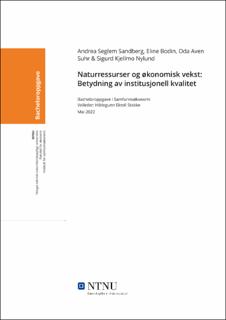| dc.contributor.advisor | Stokke, Hildegunn Ekroll | |
| dc.contributor.author | Bodin, Eline | |
| dc.contributor.author | Nylund, Sigurd Kjellmo | |
| dc.contributor.author | Sandberg, Andrea Seglem | |
| dc.contributor.author | Suhr, Oda Aven | |
| dc.date.accessioned | 2022-07-02T17:20:53Z | |
| dc.date.available | 2022-07-02T17:20:53Z | |
| dc.date.issued | 2022 | |
| dc.identifier | no.ntnu:inspera:112090681:112965255 | |
| dc.identifier.uri | https://hdl.handle.net/11250/3002397 | |
| dc.description.abstract | Land med mye naturressurser er ofte preget av dårlige utviklingsresultater, et fenomen, populært kalt ressursforbannelsen. Denne oppgaven analyserer hvorvidt kvaliteten på institusjoner spiller en sentral rolle for å fasilitere for økonomisk vekst. Datasettet i oppgaven er hentet fra verdensbanken, som er tungt investert i forskning knyttet til utviklingsøkonomi. Analysen består av OLS som økonometrisk metode. En økonomisk vekstfunksjon blir presentert, og modellen utvides til å inkludere flere betydningsfulle variabler som vil påvirke testresultatene. Oppgavens konklusjon er at institusjonell kvalitet er fundamentalt for økonomisk vekst, og spiller en sentral rolle for å unngå ressursforbannelsen. | |
| dc.description.abstract | Countries rich in natural resources often perform badly in terms of economic growth, a phenomenon popularly called the resource curse. This text will analyze how the quality of institutions play a central role in facilitating economic growth. The dataset is provided from the World Bank, which is heavily invested in research associated with development economics. An economic growth function will be presented, and the model will expand to include several significant variables which will affect the test results. The conclusion is that institutional quality is fundamental in terms of economic growth, and plays a central role to avoid the resource curse. | |
| dc.language | nob | |
| dc.publisher | NTNU | |
| dc.title | Naturressurser og økonomisk vekst: Betydning av institusjonell kvalitet | |
| dc.type | Bachelor thesis | |
